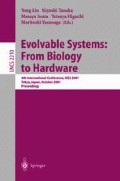Abstract
This paper introduces the concept of polymorphic electronics (polytronics).referring to electronics with superimposed built-in functionality. A function change does not require switches/reconfiguration as in traditional approaches. Instead, the change comes from modifications in the characteristics of devices involved in the circuit, in response to controls such as temperature, power supply voltage (VDD), control signals, light, etc. For example, a temperature-controlled polytronic AND/OR gate behaves as AND at 27°C and as OR at 125°C. The paper illustrates polytronic circuits in which the control is done by temperature, morphing signals, and VDD respectively. Polytronic circuits are obtained by evolutionary design/evolvable hardware techniques. These techniques are ideal for the polytronics design, a new area that lacks design guidelines/know-how,- yet the requirements/objectives are easy to specify and test. The circuits are evolved/synthesized in two different modes. The first mode explores an unstructured space, in which transistors can be interconnected freely in any arrangement (in simulations only). The second mode uses a Field Programmable Transistor Array (FPTA) model, and the circuit topology is sought as a mapping onto a programmable architecture (these experiments are performed both in simulations and on FPTA chips). The experiments demonstrate the polytronics concept and the synthesis of polytronic circuits by evolution.
Access this chapter
Tax calculation will be finalised at checkout
Purchases are for personal use only
Preview
Unable to display preview. Download preview PDF.
References
A. Stoica, Polymorphic electronics. A novel type of circuits with multiple functionality, NASA New Technology Report NPO-21213, 10/06/2000, Patent pending.
Multifunctional device http://www.ele.kth.se/FMI/research/hiep/oeic.htm
Stoica, A. Klimeck, G., Salazar-Lazaro, C. Keymeulen, D. and Thakoor, A. (1999). Evolutionary design of electronic devices and circuits. Proceedings of the 1999 Congress on Evolutionary Computation, Washington, D.C. July 6–9, pp. 1271–1278
Koza, J., F.H. Bennett, D. Andre, and M.A Keane,.Genetic Programming: Darwinian invention and problem solving., Morgan Kaufmann Publishers, San Francisco, CA, 1999
Thompson, A., Layzell, P. and Zebulum, R., Explorations in design space: unconventional electronics design through artificial evolution, IEEE Transactions on Evolutionary Computation, September 1999, V.3, N.3 pp. 167–196
Higuchi, T. et al., Real-world applications of analog and digital evolvable hardware, IEEE Transactions on Evolutionary Computation, September 1999, V.3, N.3 pp. 220–235
Stoica, A. Towards Evolvable Hardware Chips: Experiments with a Programmable Transistor Array. Proc. 7th International Conference on Microelectronics for Neural, Fuzzy and Bio-inspired Systems, Microneuro.99,. Granada, Spain, April 7–9, 1999, pp. 156–162
Stoica, A., Keymeulen, D., Tawel, R., Salazar-Lazaro, C. and Li, W..Evolutionary experiments with a fine-grained reconfigurable architecture for analog and digital CMOS circuits. Proceedings of the First NASA/DOD Workshop on Evolvable Hardware, Pasadena, CA, July 19–21, IEEE Computer Society Press, pp. 76–84, 1999
Zebulum, R. Stoica, A. and Keymeulen, D., A flexible model of CMOS Field Programmable Transistor Array targeted to Evolvable Hardware, ICES2000, pp.274–283.
A. Stoica, Ricardo Zebulum, Didier Keymeulen, Raoul Tawel, Taher Daud, and Anil Thakoor.Reconfigurable VLSI Architectures for Evolvable Hardware: from Experimental Field Programmable Transistor Arrays to Evolution-Oriented Chips. IEEE Transactions on VLSI. February 2001
R. Zebulum, M.A. Pacheco, M. Vellasco, and H. T. Sinohara,.Evolvable Hardware: Automatic Synthesis of Analog Control Systems.. In IEEE Aerospace Conference, Big Sky, Montana, March 14–25, 2000. IEEE Press.
Stoica, A. Keymeulen, D. and Zebulum, R..Evolvable Hardware Solutions for Extreme Temperature Electronics., 3rd NASA/DOD Workshop on Evolvable Hardware, July 2001, Long Beach, CA, pp.93–97, IEEE Press.
Author information
Authors and Affiliations
Editor information
Editors and Affiliations
Rights and permissions
Copyright information
© 2001 Springer-Verlag Berlin Heidelberg
About this paper
Cite this paper
Stoica, A., Zebulum, R., Keymeulen, D. (2001). Polymorphic Electronics. In: Liu, Y., Tanaka, K., Iwata, M., Higuchi, T., Yasunaga, M. (eds) Evolvable Systems: From Biology to Hardware. ICES 2001. Lecture Notes in Computer Science, vol 2210. Springer, Berlin, Heidelberg. https://doi.org/10.1007/3-540-45443-8_26
Download citation
DOI: https://doi.org/10.1007/3-540-45443-8_26
Published:
Publisher Name: Springer, Berlin, Heidelberg
Print ISBN: 978-3-540-42671-4
Online ISBN: 978-3-540-45443-4
eBook Packages: Springer Book Archive

